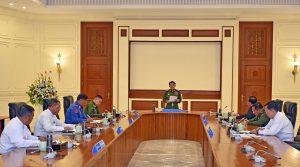Myanmar’s military junta has once again extended its state of emergency for another six months, as resistance groups continue to make battlefield gains across the country.
According to state media reports, the decision was made at a meeting of the military-controlled National Defense and Security Council (NDSC) on Wednesday, at which coup leader Senior Gen. Min Aung Hlaing held fast to his previously announced plans to hold a multi-party election.
“Holding the election is a government’s vision which never changes. Hence, preparations are ongoing to hold an election,” the Global New Light of Myanmar paraphrased Min Aung Hlaing as saying. The junta leader told the NDSC that the extension was necessary in order to enact “security measures” and “continue the restoration of peace and stability across the nation.” According to other reports, he said that the military administration also needs time to carry out a pre-election census. The new phase of emergency rule is now due to expire at the end of January; Min Aung Hlaing announced in June that polls will be conducted sometime in 2025.
During the meeting, Min Aung Hlaing repeated his prior claims that the February 2021 coup was necessary due to pervasive “voting fraud” at the general election held in November 2020. (No evidence of extensive fraud has ever been adduced.)
Such extensions are supposed to be endorsed by the country’s president, but on July 22, Myanmar state media announced that acting President Myint Swe, who had served in the role since the coup on February 1, 2021 coup, had gone on medical leave, authorizing Min Aung Hlaing to carry out the presidential duties with the NDSC.
The extension of the state of emergency – the sixth since it was imposed following the military takeover – amounted to an admission that the armed forces do not exercise enough control to prepare for the elections that the junta intends as a transition back to a form of civilianized military rule. Indeed, over the past year – and since the most recent extensions of the state of emergency, in August 2023 and February of this year – the junta’s battlefield fortunes have gone from bad to worse.
In late October, the Three Brotherhood Alliance of ethnic armed groups launched Operation 1027, a sweeping offensive in northern Shan State along the country’s border with China.
The first phase of the offensive, which ended with a China-backed ceasefire deal in January, left the Myanmar National Democratic Alliance Army (MNDAA) and Ta’ang National Liberation Army (TNLA), two members of the Alliance, in control of large swathes of territory in Shan State, including numerous towns and several important border crossings with China. The most significant of these was the MNDAA’s reconquest of the ethnic Chinese-majority Kokang region, from which the military had expelled it in 2009. At the same time, the Arakan Army, the third member of the Alliance, scored remarkable successes against the Myanmar military in Rakhine State in Myanmar’s west.
After a five-month pause in fighting, the TNLA and MNDAA, backed by allied People’s Defense Forces (PDFs) and other anti-regime groups, opened the second phase of Operation 1027 in Shan State and Mandalay Region in late June. This saw the MNDAA launch attacks on Lashio, the largest city in northern Shan State where the military’s Northeast Regional Command is located, which is reportedly besieged and on the brink of defeat. Meanwhile, the TNLA this week announced the complete seizure of the town of Mongmit in Shan State, the third town that it claims to have captured since the second phase of the offensive began.
Addressing the NDSC yesterday, Min Aung Hlaing said that the MNDAA and TNLA had “violated the temporary ceasefire agreement” and vowed to continue efforts to “forge peace and stability” in northern Shan State and Mandalay Region.
These gains, and the prospect of a full collapse of the military position in northern Shan State, make any discussion of elections increasingly fantastical and detached from reality. While it is hard to gauge claims about which groups have effective control over which areas, it is clear that the junta probably would only be able to administer elections in a minority of the country, predominantly on the dry central plain and in the major cities like Yangon, Mandalay, and Naypyidaw. Whether such partial and illusory exercise would fulfill even the military’s minimal goal of resetting international expectations or disguising its rule in civilian guise, remains very much open to question.
































